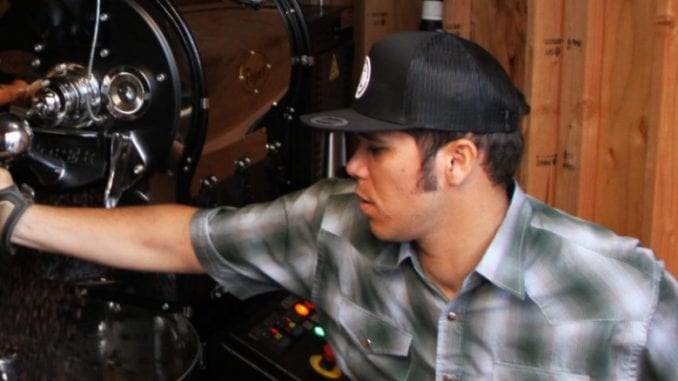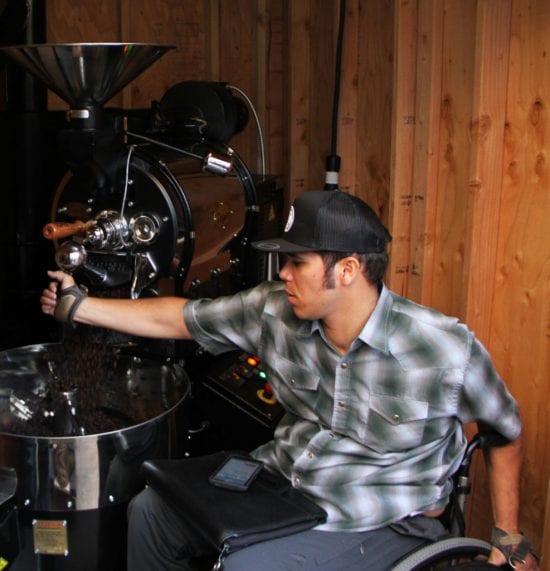
Brian Gomez talks to us about roasting from a wheelchair and how he designed his café, The Roasted Bean, to be workable and natural for both ambulatory folks and those in wheelchairs.
BY RJ JOSEPH
SPECIAL TO BARISTA MAGAZINE
Photo courtesy of KTLA5
This article accompanies a piece in the December 2017 + January 2018 issue of Barista Magazine, “Ableism Is an Issue We Should Start Addressing in the Coffee Industry.”
I was lucky enough to have the opportunity to speak with Brian Gomez, owner of The Roasted Bean in San Dimas, Calif., about roasting and accessibility. A former hobbyist with five years of roasting under his belt, Brian started The Roasted Bean three years ago after the demand from his friends and family outgrew his home-roasting setup. “After I got hurt and ended up in a wheelchair, coffee became my full-time hobby, and one day I was like, screw it, and I went out and I bought an industrial roaster and went pro.”
As a roaster in a wheelchair who also comes from a corporate background, Brian has a lot of insight into how to make spaces more accessible without necessarily spending a lot of money. One thing he pointed out in our interview is the fact that everyone’s needs and limitations are different, and a diversity of eyes on a problem allows for more comprehensive solutions. “There are things that I see and deal with, but because I’m so high-functioning, being in a wheelchair for me is more of a vertical issue than an issue of getting around, and it’s different for everyone,” he said.

Approaching the challenge of opening his own coffee shop in the next few years, Gomez pointed out some simple but easy-to-miss details, like the fact that people in wheelchairs need more space around tables or counters than ambulatory people. “I’m going to build out my coffee shop so that someone in a wheelchair won’t be too far away from the table, but someone who’s not in a wheelchair won’t even notice the difference,” he said. That, in his eyes, is the perfect setup: one that works equally well and feels equally natural for everyone. That principle also extends to the placement of the roasting consoles and machines in Gomez’s production space. “On the side of the controller and the trier, I have 55 inches of radius for my wheelchair. That gives me the ability to move around and adjust temperatures, view the coffee, and drop the roasts,” he explained. To load coffee into the hopper, he currently uses a pulley system, and on his next roaster, he aims to get a vacuum lift and loading pit, noting that those tools also save time and reduce physical strain for ambulatory roasters.
When I asked about pro tips for folks with disabilities looking to break into the industry, Gomez recommended learning some skills and finding out what speaks to you before trying to get that first job; one way or another, you’re going to be new to navigating the setup, so it’s better to not necessarily be new to all the job duties as well. He added that he made most of his professional connections by sharing home roasts through friends. “Those doors just opened for me because I brought something to the table,” he says. For companies that want to hire qualified people with physical disabilities or limitations but don’t know where to start, he recommended bringing in people with disabilities to look over your space and give you tips. “These things seem daunting to a business owner, but in actuality a lot of adjustments can be cheap and easy,” he says. “Before I got hurt, I thought you’d have to spend all this money building different kind of ramps and making bathrooms bigger, but you don’t necessarily need to do all that. There are portable ramps you can use instead, and that’s just one example.”
If you’re thinking of building out a new roasting or café space or updating your old one, think about the tiny adjustments that make the space open to everyone. When dialing in a work space, just as when roasting or brewing coffee, the difference is in the details.
 ABOUT THE AUTHOR
ABOUT THE AUTHOR
RJ Joseph roasts coffee and writes a blog called Queer Cup in addition to her other adventures in coffee journalism. Her writing focuses primarily on equity, workers’ rights, and alternatives to the status quo. In her free time she loves cooking, reading, and being in Oakland, Calif. You can follow her on Instagram and Twitter.


Adorei a ideia. Você é pessoa incrível! Parabéns ??